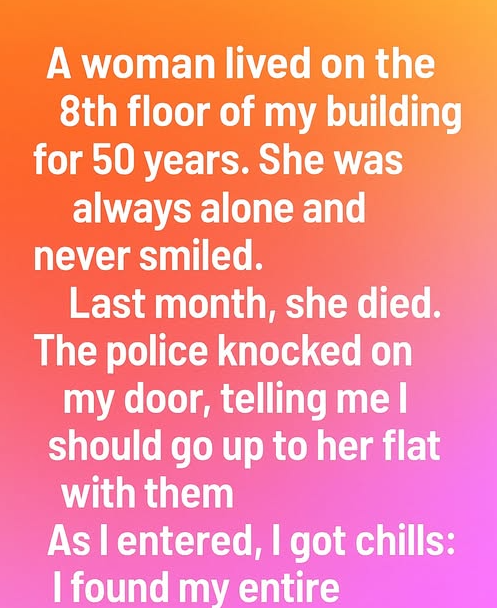For more than twenty years, the woman on the eighth floor was little more than a shadow in our apartment building. She never smiled, never made small talk, never acknowledged anyone beyond a slight nod. She moved through the halls like someone carrying a lifetime of burdens—head down, shoulders tense, eyes fixed anywhere but on another person. To all of us, she was simply “the quiet lady upstairs.” Not rude. Not hostile. Just unreachable.
So when she passed away last month, I didn’t think much of it. We weren’t close. We had never exchanged more than a polite glance. That’s why, when two officers knocked on my door the next morning and asked, “Are you listed as her emergency contact?” I responded with absolute confusion. My name? Her contact? That had to be a mistake.
“We found your information in her files,” one officer clarified. “You were the only person she listed.”
I stood there stunned. I wasn’t family. I wasn’t a friend. I was practically a stranger. But they needed someone to access her apartment, sort through personal items, and handle paperwork, so I agreed.
When they opened her door, a cold stillness washed over us—the kind of quiet that feels heavy and untouched. I braced myself for clutter, dust, maybe the stale scent of a life lived behind closed doors. But what I saw made me stop in my tracks.
Her living room walls were covered—literally covered—with framed drawings.
Children’s drawings.
My drawings.
The realization hit like a blow. When I was a kid, maybe six or seven, I used to slip crayon drawings under random doors throughout the building. Silly little scribbles—stick figures, crooked hearts, bright suns. I did it because I loved creating things… and because I hoped they might make someone smile. I always slipped extra under her door, because she looked so unbearably alone. She never acknowledged them. Never thanked me. I always assumed she threw them away.
But they were here—framed with care, arranged in perfect rows like priceless artwork.
I stepped closer, recognizing every childish creation. The purple butterfly I drew after learning to ride a bike. The lopsided house with smoke curling from the chimney. A cat that looked more like a potato with legs. Every single one preserved with astonishing tenderness.
She had kept everything.
My throat tightened.
“There’s more,” the officer said quietly.
In the corner, beneath a faded armchair, sat a wooden box. Inside lay stacks of postcards, handmade holiday cards, random little notes I had handed out as a kid—sweet, goofy things meant to brighten someone’s day.
She had saved all of them.
Some were bent from being held. Some had tape marks from when she’d hung them up. Others were stored in protective sleeves, each labeled with a neat date. It wasn’t random. It was deliberate. Careful. Loving.
I sank to the floor and sorted through the memories, overwhelmed. She’d protected things I’d completely forgotten I’d ever created. She had cherished them. Held onto them. Let them become small anchors of comfort in her life.
One officer spoke softly. “She told her social worker that you were the only person who ever showed her kindness without wanting anything in return.”
My heart stopped.
“She didn’t trust people,” he continued. “But she trusted you.”
I didn’t know what to say—or what I would’ve said to her if I still had the chance.
Suddenly, memories of seeing her over the years flooded back—the way she sometimes paused as if wanting to speak but couldn’t. The distant longing when she watched children play outside. The way she walked home alone from the grocery store with only the bare essentials.
Her isolation had always looked cold. Now it looked heartbreaking.
Then I found the envelope.
Tucked inside the wooden box, my name written in elegant script. Inside was a note—simple, brief, devastating:
“You made life less lonely. Thank you.”
Ten quiet words that cracked me open.
Her apartment wasn’t filled with loneliness—it was filled with the only love she ever felt safe enough to keep. Quiet love. Silent gratitude. Memories she didn’t know how to express, except by holding onto them.
All those years, I thought she ignored me.
But the truth was the opposite: I had been her one connection to the world, the single act of kindness she carried with her in a life that had taught her to expect nothing.
When the officers asked if I wanted any of her belongings, I chose the wooden box. Not for its material value, but because it held proof that even the smallest gestures can echo through someone’s life in ways you never imagine.
Walking out of her apartment for the last time, I felt a weight settle in my chest—not grief exactly, but realization. A quiet responsibility. A reminder that people carry invisible stories, invisible battles, invisible gratitude.
For two decades, I had passed her by assuming she lived in silence by choice. But now I understood: her silence had been armor. Her solitude had been survival. And those childish drawings had been her lifeline.
Since that day, I’ve made myself a promise: notice the quiet ones. The overlooked ones. The ones who move softly through the world. You never know who is hoping for a small kindness—or who is holding onto the memory of one.
Kindness doesn’t always echo loudly. Sometimes it waits inside a wooden box in a small apartment, guarded by someone who never found the words to say thank you.
And sometimes—years later—it finds its way back to you, revealing the depth of the difference you made.
